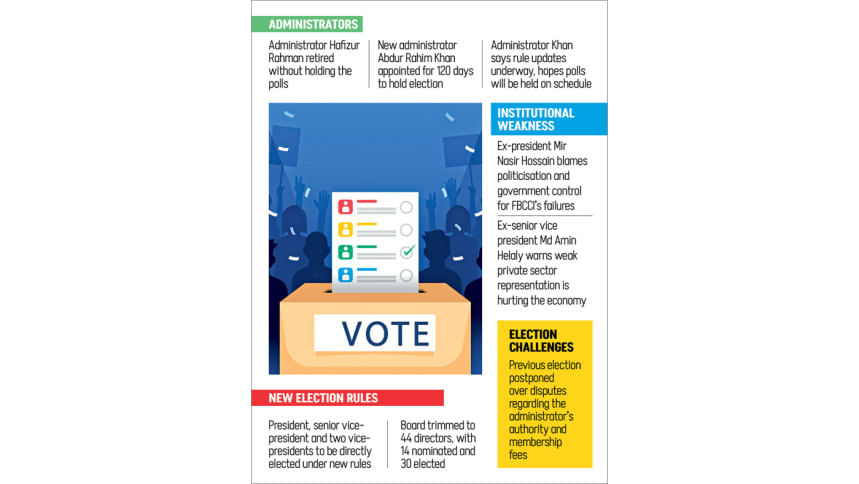Leadership vacuum at FBCCI weakens its policy role

The country's apex trade body, the Federation of Bangladesh Chambers of Commerce and Industry (FBCCI), is struggling to assist the government in policy-making and serve the business community due to a leadership crisis caused by the absence of elections, according to business leaders.The FBCCI plays a key role in advising the government, helping formulate export-import policies, setting essential commodity prices, and determining tariffs and trade regulations. Without an elected leadership, its...
The country's apex trade body, the Federation of Bangladesh Chambers of Commerce and Industry (FBCCI), is struggling to assist the government in policy-making and serve the business community due to a leadership crisis caused by the absence of elections, according to business leaders.
The FBCCI plays a key role in advising the government, helping formulate export-import policies, setting essential commodity prices, and determining tariffs and trade regulations. Without an elected leadership, its ability to represent the private sector and provide guidance has weakened.
After the political changeover last year, the interim government appointed Md Hafizur Rahman, a former bureaucrat, as FBCCI administrator for one year. He was tasked with holding an election within 120 days to run the FBCCI for two years.
Although a poll date of September 7 was set, the election was delayed 45 days by the commerce ministry after complaints from businessmen. Hafizur Rahman retired in September without conducting the election.
The government has now appointed Md Abdur Rahim Khan, an additional secretary of the commerce ministry, for 120 days, primarily to hold the election.
Former FBCCI president Mir Nasir Hossain said, "The apex trade body has failed to play its due roles mainly for two reasons — it has been politicised, and it is now run by a government-appointed administrator.
"Because of this, the real problems and challenges businessmen are facing are not being addressed, and the government is deprived of genuine consultations on trade, the economy, business, and other issues."
He added that over the past decade, FBCCI elections have become heavily politicised. "An adequate number of candidates were essentially selected in advance so that the government-backed panel would ultimately win. Influential government high-ups directly and indirectly interfered in the election process."
Hossain further noted, "The private sector's representation in the FBCCI is no longer effective because government-appointed bureaucrats cannot speak for the private sector. As a result, the FBCCI cannot give necessary advice on economic and commerce policies."
"The FBCCI charter should be amended, and elections should be held as soon as possible," he added.
IMPACT ON BUSINESS COMMUNITY AND ECONOMY
Md Amin Helaly, former senior vice president of FBCCI, said. "The FBCCI is failing to represent the business community because elections to choose its leadership are not being held.
"In Bangladesh's $500 billion economy, the local private sector holds nearly 85 percent of the stakes, yet it is not properly reflected in the apex trade body. The government should have formed a commission to implement reforms in the private sector, including in the FBCCI."
He added, "Since the FBCCI cannot perform its role effectively, the private sector suffers, and this ultimately impacts the economy."
Abdul Hai Sarker, chairman of Dhaka Bank PLC, said, "The FBCCI leadership was meant to be led by socially respected business figures, but unfortunately, this has not happened for many years. The leadership has eventually become a one-man, one-board FBCCI, which, as a federation, can hardly contribute to policy formulation on trade, economy, business, and commerce."
He cited India as an example, where the Federation of Indian Chambers of Commerce and Industry (FICCI), the country's apex trade body, actively works with the government to provide quality consultation on import policies.
"We need to significantly improve the quality of leadership in the FBCCI," Sarker added.
Anwar-Ul-Alam Chowdhury (Parvez), president of the Bangladesh Chamber of Industries, said, "Industries have been suffering from the lack of qualitative services. We need FBCCI leadership that can serve businesses and the government responsibly."
ELECTION CHALLENGES AND NEW RULES
According to Md Hafizur Rahman, the election was postponed during his tenure due to two cases -- one related to the election commission and the other to membership fees.
"One case challenged the administrator's power to form the election commission, but it was later withdrawn as the trade rules allow both the administrator and the director general of the trade organisation to form the FBCCI election commission," he said
"Secondly, the membership fee was set at Tk 20,000 for a two-year renewal with the FBCCI. This was also challenged in court but later withdrawn," he added, noting that the FBCCI now has no legal obligation to hold the election.
Explaining the new election rules, Rahman said, "The FBCCI president, one senior vice-president, and two vice-presidents will be directly elected instead of being nominated by the nominated and elected directors.
"The number of directorial posts has also been reduced. Under the new rules, 14 directors will be nominated from key business chambers and trade associations -- seven from chambers and seven from association groups, including one female from each group. "
"Another 30 directors will be elected directly -- 15 from the chamber group and 15 from the association group," he added.
Previously, of the 80 director posts, 34 were nominated -- 17 from the chamber group and 17 from the association group -- while the remaining 46 were elected, with 23 from each group.
Current FBCCI Administrator Md Abdur Rahim Khan told The Daily Star, "Work has begun to update the organisation's rules, and I am hopeful to hold the election on time."